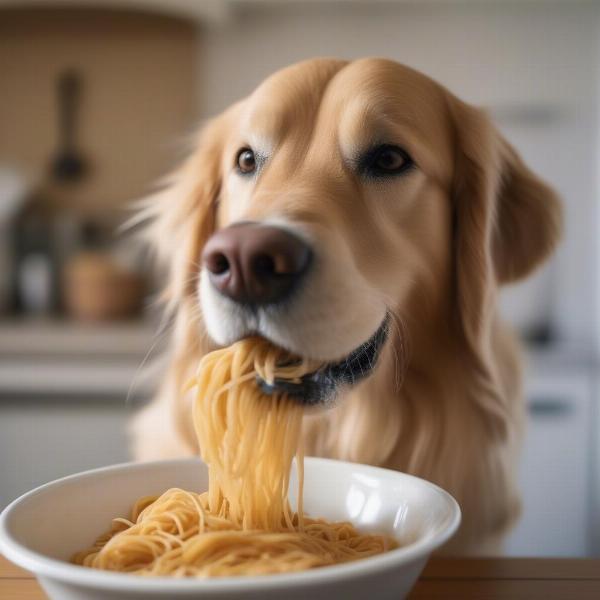Pasta, a staple in many human diets, is sometimes shared with our canine companions. But is pasta dog food a healthy option, or just an occasional indulgence? This article will delve into the nutritional value of pasta for dogs, explore the potential benefits and risks, and guide you on how to safely incorporate pasta into your dog’s diet.
Can Dogs Eat Pasta? Understanding the Basics
Yes, dogs can eat pasta. Plain, cooked pasta in moderation generally won’t harm your dog. It’s primarily composed of carbohydrates, which can provide a source of energy. However, pasta offers limited nutritional benefits compared to complete and balanced dog food. It lacks essential proteins, vitamins, and minerals that dogs require for optimal health.
Nutritional Value of Pasta for Dogs
While pasta can be a source of energy, it’s important to consider its nutritional content. White pasta is lower in fiber and nutrients than whole wheat pasta. Whole wheat pasta offers a slightly better nutritional profile with added fiber, which can aid in digestion. However, even whole wheat pasta shouldn’t form the foundation of your dog’s diet.
 Dog Enjoying Pasta From a Bowl
Dog Enjoying Pasta From a Bowl
Benefits and Risks of Feeding Pasta to Dogs
One potential benefit of including a small amount of plain pasta in your dog’s diet is the added carbohydrates for energy, especially for active dogs. However, the risks outweigh the benefits if pasta is given in large quantities or frequently. Too much pasta can contribute to weight gain and obesity. It can also lead to digestive upset, including bloating and diarrhea.
How to Safely Incorporate Pasta into Your Dog’s Diet
If you choose to give your dog pasta, ensure it’s cooked and plain. Avoid adding sauces, seasonings, or butter, as these can be harmful to dogs. Garlic and onions, common ingredients in many pasta sauces, are toxic to dogs. Offer pasta in small quantities as an occasional treat, not as a meal replacement.
Choosing the Right Pasta for Your Dog
Opt for whole wheat pasta over white pasta due to its higher fiber content. Avoid flavored pasta or pasta containing spices or seasonings. Always introduce new foods gradually to monitor for any adverse reactions.
What About Gluten-Free Pasta for Dogs?
If your dog has a gluten intolerance or allergy, gluten-free pasta can be a suitable alternative. Look for options made from rice, quinoa, or lentils. Always consult with your veterinarian before introducing new foods, especially if your dog has any underlying health conditions.
Can Puppies Eat Pasta?
Puppies have specific dietary needs for growth and development. While a small amount of plain, cooked pasta is unlikely to cause harm, it’s crucial to focus on feeding them a complete and balanced puppy food formulated for their age.
Pasta Dog Food Recipes: Simple and Healthy Options
While plain pasta can be offered occasionally, incorporating it into a balanced meal can be a healthier approach. Mix small amounts of cooked pasta with cooked lean meats, such as chicken or turkey, and vegetables like carrots or green beans. This can create a more nutritious and appealing meal for your dog.
Conclusion
Pasta can be a safe occasional treat for dogs, but it shouldn’t be a regular part of their diet. Focus on providing a complete and balanced dog food formulated for their age and breed. If you choose to give your dog pasta, make sure it’s plain, cooked, and offered in moderation. Always consult your veterinarian if you have any concerns about your dog’s diet.
FAQ
- Can dogs eat pasta with sauce? No, most pasta sauces contain ingredients harmful to dogs, such as garlic, onions, and excessive salt.
- Is pasta good for dogs with sensitive stomachs? No, pasta can sometimes cause digestive upset in dogs with sensitive stomachs.
- Can I give my dog uncooked pasta? No, uncooked pasta can be difficult to digest and may cause choking hazards.
- What are some healthy alternatives to pasta for dogs? Brown rice, sweet potatoes, and quinoa are healthy alternatives to pasta.
- How often can I give my dog pasta? Offer pasta as a very occasional treat, not more than once or twice a month.
- Can dogs eat all types of pasta? Stick to plain, whole wheat pasta and avoid flavored or seasoned varieties.
- Should I consult my vet before giving my dog pasta? If your dog has any underlying health conditions, it’s best to consult your veterinarian before introducing new foods.
Related Articles:
About ILM Dog:
ILM Dog is your trusted resource for comprehensive dog care information. We offer expert guidance on dog breeds, health, training, nutrition, grooming, and much more. Our goal is to empower dog owners worldwide with the knowledge and resources they need to provide the best possible care for their furry companions. For any questions or further assistance, feel free to contact us at [email protected] or call us at +44 20-3965-8624.